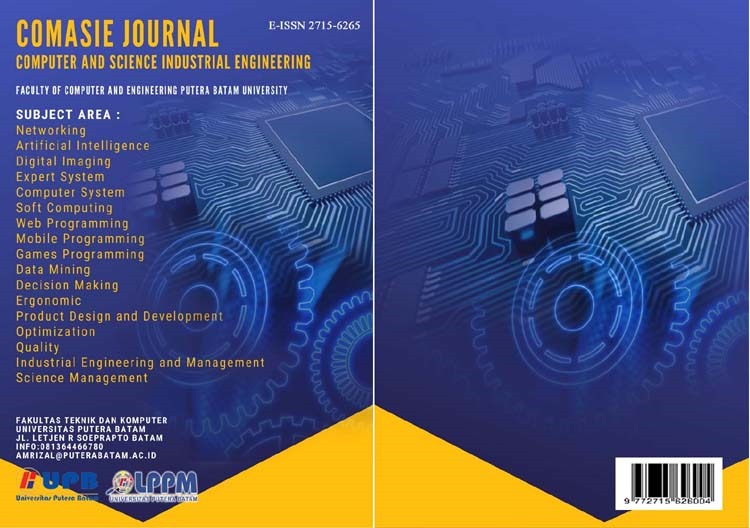PENERAPAN DATA MINING UNTUK PREDIKSI PENGARUH PENGGUNAAN APLIKASI GETCONTACT TERHADAP KEAMANAN PENGGUNA DALAM MENERIMA PANGGILAN DAN PESAN
DOI:
https://doi.org/10.33884/comasiejournal.v11i4.9088Kata Kunci:
Application GetContact; Data Mining; User Security; Naive Bayes;RapidMinerAbstrak
The study predicts the impact of the GetContact application on user security by using data mining using Naïve Bayes techniques. By using GetContact as a spam and call information filter, users can find and filter unwanted calls and messages. The app send spam or scam notifications based on the labels on the numbers it calls, with milions of users worldwide. Using RapidMiner software to analyze the data, this study used user data in the Batamindo Dormitory Block Q17 Muka Kuning. There were a total of 91 data used, divided into 61 training data and 30 test data. The result of the prediction of the influence the use of the GetContact application with Naïve Bayes resulted in model performance of 83,33% accuracy, 80% precision, and 90% recall. These result show that Naïve bayes successfully predicted the test data class. Of the 30 test data, 16 have a “Yes” class and 14 have a “No” class. This shows that 16 out of 30 users believe that the GetContact app compromises user security, while 14 out of 30 users feel the opposite.
Referensi
Alghifari, F., & Juardi, D. (2021). Penerapan Data Mining Pada Penjualan Makanan Dan Minuman Menggunakan Metode Algoritma Naïve Bayes. Jurnal Ilmiah Informatika, 9(02), 75–81. https://doi.org/10.33884/jif.v9i02.3755
Amanda, A. D., Windarto, A. P., & Qurniawan, H. (2022). Analisis Kepuasan Konsumen terhadap Pelayanan Store Ms Glow Menggunakan Metode Naïve Bayes. Hello World Jurnal Ilmu Komputer, 1(3), 130–144. https://doi.org/10.56211/helloworld.v1i3.139
Apandi, T. H., & Sugianto, C. A. (2019). Algoritma Naive Bayes untuk Prediksi Kepuasan Pelayanan Perekaman e-KTP. JUITA : Jurnal Informatika, 7(2), 125. https://doi.org/10.30595/juita.v7i2.3608
Gustientiedina, G., Siddik, M., & Deselinta, Y. (2020). Penerapan Naïve Bayes untuk Memprediksi Tingkat Kepuasan Mahasiswa Terhadap Pelayanan Akademis. Jurnal Infomedia, 4(2), 89. https://doi.org/10.30811/jim.v4i2.1892
Hant, M. I. P., & Hendry, H. (2022). Data Mining Technique Using Naïve Bayes Algorithm To Predict Shopee Consumer Satisfaction Among Millennial Generation. Jurnal Teknik Informatika (Jutif), 3(4), 829–838. https://doi.org/10.20884/1.jutif.2022.3.4.295
Musfiroh, D., Khaira, U., Utomo, P. E. P., & Suratno, T. (2021). Analisis Sentimen terhadap Perkuliahan Daring di Indonesia dari Twitter Dataset Menggunakan InSet Lexicon. MALCOM: Indonesian Journal of Machine Learning and Computer Science, 1(1), 24–33. https://doi.org/10.57152/malcom.v1i1.20
Nursatika Kusuma, I., & Ali, I. (2024). Analisis Sentimen Pada Pengguna Aplikasi Dana Menggunakan Algoritma Naive Bayes. JATI (Jurnal Mahasiswa Teknik Informatika), 8(2), 1470–1476. https://doi.org/10.36040/jati.v8i2.9041
Suparyanto. (2022). Klasifikasi Kepuasan Layanan Akademik Di STMIK El Rahma Menggunakan Metode Algoritma Naive Bayes. Jurnal Informatika Komputer, Bisnis Dan Manajemen, 20(2), 100–111. https://doi.org/10.61805/fahma.v20i2.37
Walhidayat, W., Devega, M., & Handayani, S. (2021). Data Mining (Klasterisasi) Perbandingan Mahasiswa Yang Mendaftar Terhadap Mahasiswa Yang Diterima. ZONAsi: Jurnal Sistem Informasi, 3(1), 59–70. https://doi.org/10.31849/zn.v3i1.7638
Yusnida Lase, Y., Fatmi, Y., Haryadi, & Prayudani, S. (2023). Prediksi Dampak Pembelajaran Hybrid Learning Menggunakan Naive Bayes. Bulletin of Information Technology (BIT), 4(4), 425–429. https://doi.org/10.47065/bit.v4i4.968














